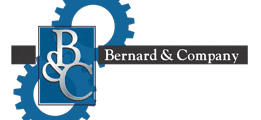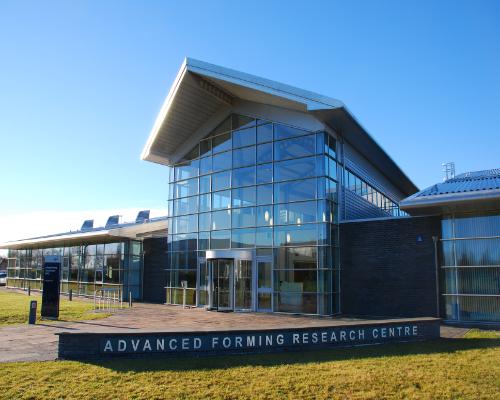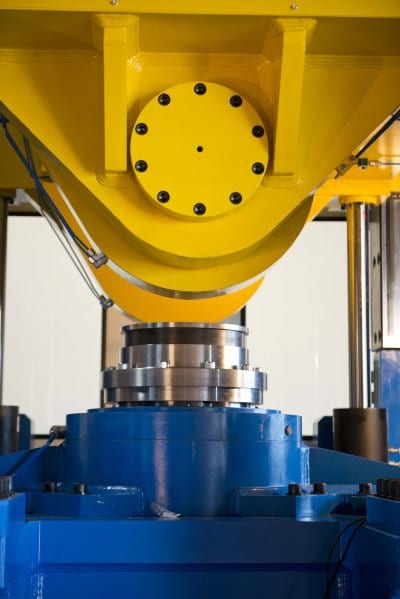Contact us today:

(847) 934-4500
tdaro@bernardandcompany.com

Contact us today:
(847) 934-4500
tdaro@bernardandcompany.com
High precision 3D mapping supports installation of a new beam transport line for scientific research
Fermi National Accelerator Laboratory (Fermilab), America’s premier high-energy particle accelerator laboratory, in Batavia, Illinois, collaborates with scientists from around the world to perform pioneering research, operate world-leading particle accelerators, plus experiment and develop technologies for science supporting U.S. industry.
In 2014, Fermilab contracted Exact Metrology to work on a project known by its location as “Main Injector Ring Section MI-10.” Horst Friedsam, Head of the Alignment & Metrology Department at Fermilab, led the week-long project with Exact Metrology, which involved 3D mapping of existing equipment in order to yield data to support the placement and installation of an additional beam transport line.
Exact Metrology performed the scanning in section 10 of the Main Injector Accelerator, which is situated in a tunnel about 10 m below ground with a circumference of approximately two miles. The Main Injector accelerates a proton particle beam, arriving from the 8 GeV (Giga-electron-Volts) Booster, to 120 GeV and subsequently blasts it into a stationary target to generate the world’s highest intensity neutrino beams.
Recently, Fermilab has been working on a new Deep Underground Neutrino Project (DUNE) to provide a neutrino beam to the Homestake Mine in South Dakota. This project features access to research facilities 2 miles below ground, which is ideal for neutrino experiments requiring shielding from cosmic ray events. In order to deliver a neutrino beam to the DUNE, a new beam transport line that fits within the existing beam line infrastructure was required. As a result, data scanning, full CAD modeling and photo overlays of a large section of the currently installed Main Injector equipment was needed. The collected data were crucial for the design of new beam elements and visualizing interferences with existing components.
The Alignment & Metrology Department maintained a high precision control network throughout the laboratory complex. For the scanning process, a Leica ScanStation P20 ultra-high speed 3D Scanner was used in conjunction with special laser scanner targets, modified to fit within the existing control network points. Exact Metrology’s Leica ScanStation P20 was chosen for its combination of high accuracy and low scan noise, plus its industry-leading environmental specifications for industrial as-built documentation. The software chosen to aid the process was Leica Cyclone, producing TruView—a web-enabled panoramic point viewer allowing the user to view, pan, zoom, measure and mark up point cloud data over the web. Additionally, RSL300 laser scanner target markers from Berntsen International Inc. were mounted concentric to 1.5” radius steel half spheres interfacing with Exact Metrology’s laser tracker nests. The coordinates of the control network, determined at the millimeter level, were provided to Exact Metrology to globally register all scans relative to Fermilab’s system. Thus, the end product provides information for all scanned objects in the common coordinate system used for the entire Fermilab site.
Fermilab has a long-existing relationship with Exact Metrology, having purchased and rented equipment from their instrument pool plus contracted for metrology services as on-site work, such as this scan.
Exact Metrology is an ISO 9001:2008 Certified Company.

For more information on this new system, please contact:
EXACT METROLOGY, INC.
11575 Goldcoast Drive
Cincinnati, Ohio 45249
Phone: 513-831-6620
Toll Free: 866-722-2600
www.exactmetrology.com
stevey@exactmetrology.com
Steve Young, President
Or
EXACT METROLOGY, INC.
Dean Solberg
20515 Industry Avenue
Brookfield, WI 53045
Phone: 262-533-0800
Local: 866-722-2600
www.exactmetrology.com
deans@exactmetrology.com
Or
FERMI NATIONAL ACCELERATOR LABORATORY (FERMILAB)
1117 N Washington Ave
Batavia, IL 60510
Phone: 630-840-2787
Horst Friedsam
—
Exact Metrology, with facilities in Cincinnati and Milwaukee and affiliated offices throughout the Midwest, is a comprehensive metrology services provider, offering customers 3D scanning, reverse engineering, quality inspection, product development and 2D drawings. The company also provides turnkey metrology solutions, including equipment sales and lease/rental arrangements.
See the MJC video HERE.
Custom machine tool builder in California contracts with research center at university in Glasgow, Scotland to design specialized equipment for forming new jet engine structures; machine completely controlled by Siemens CNC

AFRC facility performs fundamental and applied research on the forming and forging of metals, primarily for aerospace applications. A full battery of materials and performance testing is conducted at AFRC by a team of materials and process experts
MJC Engineering is a custom machine tool builder, specializing in metalforming machines for such applications as spinning, flow forming, wheel spinning and rotary forging. The company was recently contracted by the Advanced Forming Research Centre (AFRC) at the University of Strathclyde in Glasgow, Scotland for a very unique application, namely, a cold-forming rotary forge press that works the material between two synchronized rotary dies. The dies operate in angle from the parallel. Typically, the angle is fixed but, on this custom designed machine from MJC, the angle is fully programmable. This configuration allows compression in a concentrated area and provides a more efficient method for metal deformation, while producing superior mechanical properties in the finished section. Up to 90 percent material savings can be achieved by the use of this revolutionary metalforming technology, in comparison to conventional machining from a solid blank.

Operator loads workpiece during test run-up on machine; very hard aerospace materials such as Hastelloy and Inconel are typically processed
The aim of this new CNC technology, according to MJC company president Carl Lorentzen, is to make the aerospace engineers rethink how they design their products, so that a maximum material savings on exotic and costly metals can be realized.
Rotary forging can be defined as a two-die forging process that deforms only a small portion of the workpiece at a time, in a continuous manner. The reduced instantaneous area of tool and workpiece contact means lower forging forces are required to cause deformation in the material. Typical components for rotary forge operations are round or cylindrical hollow parts that deploy expensive or exotic alloys, require extreme material property targets or involve very complex geometries. At AFRC, the rotary forging machine provided by MJC is processing AerMet® 100, Inconel 718 and Allvac® 718Plus®, Ti-6Al-4V as well as the creep-resistant Ti6242 and some beta alloys.

New rotary forge press from MJC, built specially for the Advanced Forming Research Centre (AFRC) at the University of Strathclyde in Scotland. Two independent and synchronized rotary dies are fully programmable on the Siemens CNC to affect 0-45º pitch angles
Onboard the machine, the bottom and top spindles pivot from 0-45º, operated by AC vector motors and drives, plus an overall motion control CNC, all provided by longtime supplier to the builder, Siemens. The CNC is a Sinumerik 840D, which controls all the axis and spindle motion, hydro and servo positioning valves, plus the synchronization of up to four cylinders for the integrated motion of the rotary dies. In the processing of the workpiece, the control is monitoring all machine conditions, while maintaining the synchronized angles of the twin rotary dies.
Programmed motion sequences on the machine must be maintained with high precision to avoid improper deformation of the materials during the cold-forming process. In a manufacturing environment, where the high production output of parts is critical, this process must remain extremely well-regulated, documented and monitored. The CNC has the capability to upload all data in real time.

The unique operation of this MJC rotary forging press involves the application of pressure on a small portion of material at a time, reducing stress and saving up to 90% in material, compared to subtractive machining from a solid blank
Carl Lorentzen comments further on this MJC development, “Though the concept of the rotary die forge is certainly not new, the computer-controlled synchronized dual rotary dies on this machine offer a number of unique advantages in the cold-forming process of metals. The idea originated in a somewhat different form in the automotive market with the development of a front wheel hub hollow shaft. The cold-forming of metal around a bearing was combined with robot loading in production. The concept, combined with the Siemens CNC and its ability to control all the motion so precisely, made the development of this machine more practical for us.”
MJC is a custom machine tool builder, with equipment currently serving in the military, aerospace, general metalforming and automotive after-market segments of industry. The company is a member of PMA, NFTC and AMT.
The AFRC is jointly sponsored by the Scottish government, Scottish Enterprise and a variety of international aerospace manufacturers and engineering firms, including Boeing, Rolls Royce, TIMET, Aubert & Duval and Barnes Aerospace. It has operated as a world-class facility, supporting fundamental and applied research into the forming and forging of metals, since 2009. Having doubled in size recently, AFRC is expanding its market applications into the automotive, energy and marine markets. The center can currently heat, shape, finish, measure, test and analyze all types of metal materials and components in-house. The research done here comprises investigations into residual stress, die life, process characterization, materials characterization, heating and thermal processes, super-plastic forming, sheet forming and related technologies in automation, metallurgy and metrology.
The key challenge for AFRC, according to its website, is to take low maturity technology developed in a university environment and successfully deploy it into a manufacturing facility.
See the video of MJC @FabTech HERE.
For more information on this story, please contact:
MJC ENGINEERING & TECHNOLOGY, INC.
15701 Container Lane
Huntington Beach, CA 92649
Phone: 714-890-0618
Fax: 714-895-3561
Web: www.mjcengineering.com
Email: clorentzen@mjcengineering.com or carlson@mjcengineering.com
Attention: Carl Lorentzen, President or Per Carlson, VP
or
SIEMENS INDUSTRY, INC.
DRIVE TECHNOLOGIES
MOTION CONTROL
390 Kent Avenue
Elk Grove Village, IL 60007
Phone: 847-640-1595
Web: www.usa.siemens.com/cnc
Email: SiemensMTBUMarcom.industry@siemens.com
Attention: John Meyer, Manager of Marketing Communications
Follow us on Facebook: www.facebook.com/SiemensCNC or Twitter: www.twitter.com/siemens_cnc_us.
—
Siemens Industry Sector is the world’s leading supplier of innovative and environmentally friendly products, solutions and services for industrial customers. With end-to-end automation technology and industrial software, solid vertical-market expertise, and technology-based services, the sector enhances its customers’ productivity, efficiency and flexibility. With a global workforce of more than 100,000 employees, the Industry Sector comprises the Industry Automation, Drive Technologies and Customer Services Divisions as well as the Metals Technologies Business Unit.
The Siemens Drive Technologies Division is the world’s leading supplier of products, systems, applications, solutions and services for the entire drive train, with electrical and mechanical components. Drive Technologies serves all vertical markets in the production and process industries as well as the infrastructure/energy segment. With its products and solutions, the division enables its customers to achieve productivity, energy efficiency and reliability.